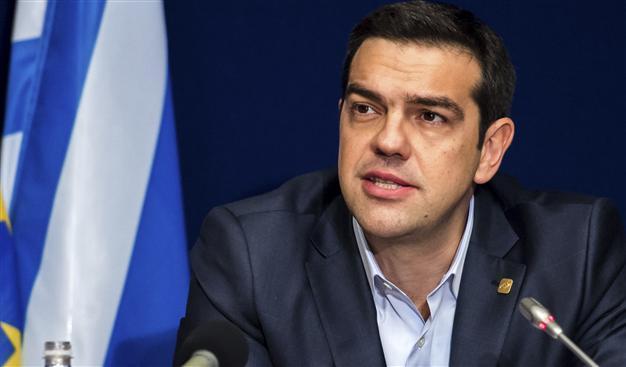Greece 'does not blackmail and will not be blackmailed': Tsipras
BRUSSELS - Agence France-Presse

Greek Prime Minister Alexis Tsipras speaks during a media conference after an EU summit in Brussels on Thursday, Feb. 12, 2015. AP Photo
Greece began tough negotiations with its creditors on Friday as hopes
grew of a deal to replace its detested bailout after new Prime Minister
Alexis Tsipras pushed his case at a European summit.
Officials
from Athens held technical discussions with the EU, International
Monetary Fund and European Central Bank in Brussels ahead of a
last-ditch meeting of eurozone finance ministers on Monday.
European
and Asian stock markets rose Friday on the more positive mood after
hard-left leader Tsipras met German Chancellor Angela Merkel, the leader
of Europe's biggest economy, and other counterparts in Brussels.
Tsipras
vowed after his election in January to replace the current
240-billion-euro ($270-billion) EU-IMF bailout with its heavy austerity
measures, and to ditch the so-called troika of its creditors.
But
with the Greek rescue programme due to expire at the end of the month,
time is running out to prevent a possible Greek default and a
potentially catastrophic exit from the 19-country eurozone.
A
senior EU official closely involved in Friday's technical-level talks
said that a new bailout programme was an option, despite the insistence
of Greece's eurozone counterparts until now that Athens stick to the
current rescue package.
"It is not crucial to extend. One
could also agree that one will commence discussions on a new programme,"
the EU official said on condition of anonymity. "I would not exclude
it."
While the Greek negotiators are
meeting the same group of creditors they have vowed to abandon, the EU
official also raised the possibility of a new format, or at the very
least a new name for the group.
"There is no desire on anybody's part necessarily to call it the 'troika'," he said.
There
was cautious optimism on Friday in Greece, which has suffered from the
harsh austerity measures imposed under the international bailouts that
have kept it from bankruptcy since 2010.
Greek stocks were
up 4.65 percent, even though new data showed Greece's recovery from
recession stalled in the last quarter of 2014 amid the political crisis
that led to Tsipras's election and the ouster of the conservative
government.
"Bridge of dialogue," wrote centre-left Ethnos
daily while liberal Kathimerini saw a "window of opportunity for
compromise."
But the new Greek government warned against premature celebration.
"We
don't want to spread enthusiasm before the deal is done," government
spokesman Gabriel Sakellaridis told Antenna TV. "Greeks should
understand that this is a critical and difficult negotiation, the
pressure is enormous."
In the face of tough opposition
from Germany, as well as other former bailout countries like Ireland and
Portugal that do not see why Greece should get an easy ride, Tsipras
had taken a tough tone after his first European summit
"Greece will not blackmail or be blackmailed," he said.
But
the rhetoric appeared to mask some compromise, as he said that he
discussed the possibility of a six-month bridging programme to give
Greece time to work on a different programme that would be acceptable to
its creditors.
Merkel, Europe's queen of
austerity, suggested at the summit that a "compromise" was possible and
spoke of a "friendly" encounter with Tsipras, during which they shook
hands in front of the cameras.
It was all a far cry from a
bad-tempered meeting of eurozone finance ministers the day before, which
broke up without even issuing a joint statement on the way ahead.
In Brussels on Friday, negotiators were poring over Greece's plans
to "show where there are areas of overlap and areas of underlap" with
its creditors before Monday's eurozone meeting.
Next week with
the eurozone meeting on Monday is seen as the crucial time for a deal
otherwise there will be little time to get any compromise passed by
eurozone countries' parliaments.
Under the Greek proposals,
Athens would stick to 70 percent of the bailout programme but it would
overhaul the remaining 30 percent which it sees as damaging to growth
and toxic for ordinary Greeks.
Athens also proposes debt swaps
based on economic performance as the Greek economy moves out of
recession.
But Europgroup chief Jeroen Dijsselbloem said Friday he is "pessimistic" about reaching any quick deal with Greece.
"The Greeks have sky-high ambitions. The possibilities, given the
state of the Greek economy, are limited," said Dijsselbloem, who is the
Dutch finance minister.
